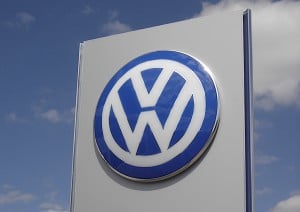
Volkswagen apologized after it pulling its Instagram ad for its new Golf hatchback after realizing it featured several racist cues, including a white supremacist symbol.
Volkswagen has come under fire for a short-lived social media ad for its new Golf hatchback that, critics contend, was racist.
Company officials said they were “horrified” after seeing the 10-second spot which ran on both Instagram and Twitter and are promising an investigation.
The video spot shows a giant white hand sweeping into the frame, reaching over to grab a black man who had approached a new, yellow Volkswagen Golf parked on the street. It then flicks him through the doorway of a nearby café.
(Volkswagen of America offering help to others.)

Volkswagen said it will launch an investigation to see how the offending ad managed to get approved.
Adding to the concerns, the name above the door is “Petit Colon,” which translates from French into “Little Colonist.” Some critics also contend that the hand makes a white power gesture as it reaches for the person approaching the car.
The ad drew an immediate barrage of criticism but the automaker briefly appeared to take exception. It issued an initial statement saying, it was “surprised and shocked that our Instagram story could be so misunderstood,” according to the BBC.
But the company quickly shifted its position while pulling the 10-second spot from social media.
(Volkswagen shutting European plants for two weeks, warns of “very difficult year.”)
“Without question: the video is inappropriate and tasteless,” Volkswagen said in a statement. “We will clarify how something like this could happen, and there will be consequences.”
The automaker acknowledged what critics claimed Juergen Stackmann, VW’s head of sales, as well as Elke Heitmueller, its head of diversity, issuing a public apology that acknowledged “We posted a racist advertising video on Volkswagen’s Instagram channel,” and adding that. “We understand the public outrage at this. Because we’re horrified, too. This video is an insult to all achievements of the civil rights movement. It is an insult to every decent person.”
VW has been particularly sensitive to any claims of racism, misogyny and anti-Semitism, in part due to its admitted role during the Nazi era when it used Jews and other slave laborers at its factories.
How the ad could have gotten out in the first place remains unclear. VW pointed out that it used outside agencies to produce its advertising. But sources within the ad community said it would be highly unusual and unlikely for an agency to run a spot or campaign without getting at least some level of approval from the client.
(Volkswagen shifting to different battery for EVs.)
It’s not the first time VW has found itself in hot water with critics claiming racism over one of its ads. In 2013 it was criticized for a spot that ran in the Super Bowl featuring a white Minnesota office worker speaking in a distinct Jamaican accent telling coworkers to “Be happy.”

